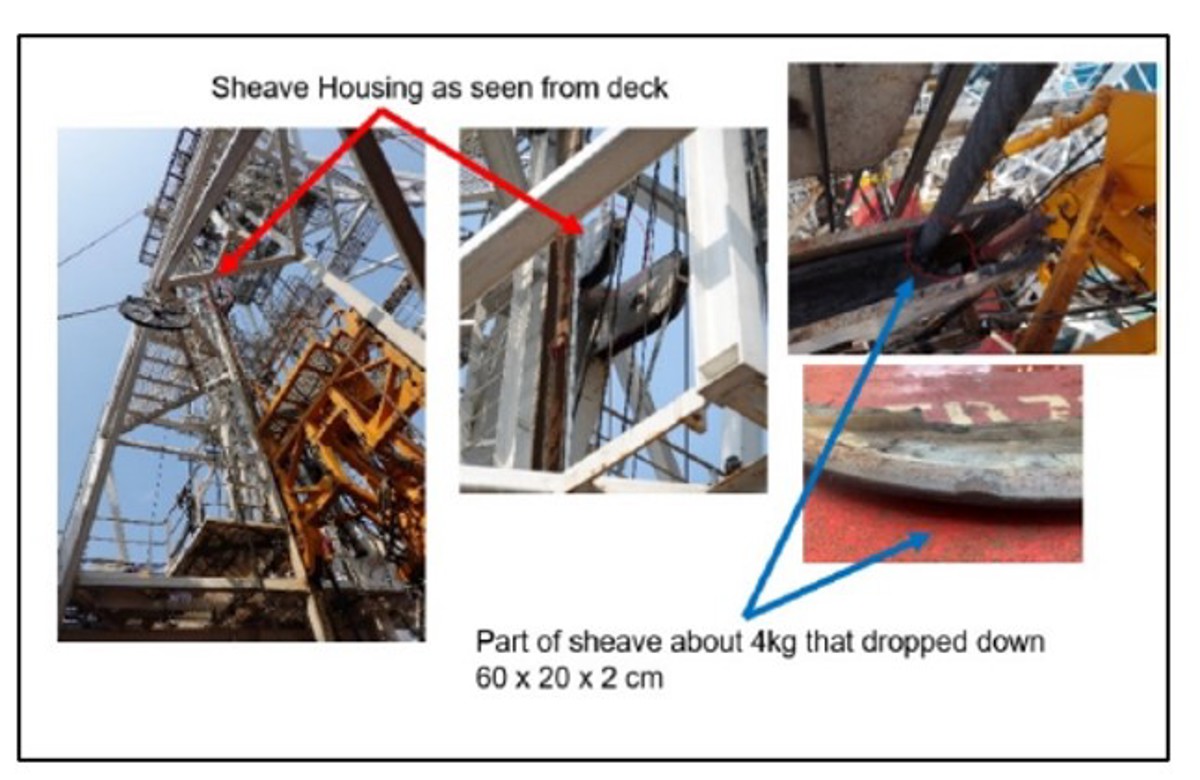Dropped Object from Derrick
- Safety Flash
- Published on 4 September 2020
- Generated on 15 February 2026
- IMCA SF 26/20
- 2 minute read
Jump to:
What happened?
While running in drill pipe on a drilling vessel, part of a guide sheave failed and fell approximately 15 m to the drill floor.
A ‘Red Zone’ was in place to restrict access to the drill floor during hazardous activities. Nobody was injured.

What were the causes? What went wrong?
The sheave had seized and failed due to a combination of:
- Design – lack of inspection hole in the sheave.
- A small fleet angle resulting in lateral forces on one side of the sheave.
- Installation – incorrect thickness spacer fitted by a contractor during refurbishment and a lack of a protective coating (paint).
- Quality control – inadequate inspection & testing of the installation / contractor’s work.
- Maintenance and inspection – failure to spot equipment defects and inadequacy of secondary retention.
Lessons learned
- Planned preventative maintenance systems should take account of all equipment including ancillary equipment, irrespective of whether or not the equipment was original or retrofitted.
- Robust supervision and quality control of contractors is essential to ensure that the technical specifications, installation process, functional testing and documentation requirements are complied with.
- A dropped object ‘Red Zone’ is intended to keep unauthorised personnel out of the potentially hazardous area and should be continually assessed for effectiveness.
Actions
- Amended vessel preventative maintenance system to include more detailed requirements for the inspection of ancillary equipment (e.g. sheaves, floodlights and other potential dropped object hazards) including the details of any applicable standards.
- Implemented Work Report templates to be prepared and submitted by contractors describing comple.ed refurbishment / maintenance works.
- Revised designated ‘Red Zones’ to include “Safe Standing Zones” with overhead protective shielding.
IMCA Safety Flashes summarise key safety matters and incidents, allowing lessons to be more easily learnt for the benefit of the entire offshore industry.
The effectiveness of the IMCA Safety Flash system depends on the industry sharing information and so avoiding repeat incidents. Incidents are classified according to IOGP's Life Saving Rules.
All information is anonymised or sanitised, as appropriate, and warnings for graphic content included where possible.
IMCA makes every effort to ensure both the accuracy and reliability of the information shared, but is not be liable for any guidance and/or recommendation and/or statement herein contained.
The information contained in this document does not fulfil or replace any individual's or Member's legal, regulatory or other duties or obligations in respect of their operations. Individuals and Members remain solely responsible for the safe, lawful and proper conduct of their operations.
Share your safety incidents with IMCA online. Sign-up to receive Safety Flashes straight to your email.